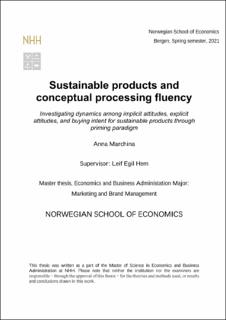| dc.description.abstract | In today’s information-dense environment, people struggle to filter through the abundance of content from social media, emails, newsletters, and advertisements, while companies battle for the slightest chance of getting their communication efforts noticed by the desired segments. Due to such intense competition for attention, marketers not only utilize consumers’ direct information processing but also rely on their peripheral and implicit cognition. With that in mind, when it comes to marketing sustainable offers, a significant amount of misunderstanding, distrust, perceptual barriers, and ignorance still has to be overcome. The purpose of this master thesis was to explore how unconscious information processing mechanisms influence green consumer choices. More specifically, this study addresses how priming for conceptual processing fluency can affect consumer preferences for sustainable products. The effects of sustainability and product category concepts were compared.
A classical experiment with the pre-post test design was conducted online to identify the dynamics in participants’ implicit and explicit attitudes and buying intention, based on the VABH framework, depending on what type of context they were primed for. It involved a non-probability self-selected sample of NHH students, who completed IATs and answered questionnaires regarding imaginary cleaning products before and after treatment. One of the products was regular, while the other one had prominent eco-friendly features. The treatment in experimental groups consisted of a concentration task and an advertisement exposure.
The findings were consistent with the adopted VABH theory. Both concepts used in priming facilitated stronger guidance of buying intention by attitudes. Eco-friendly context strengthened the influence of explicit attitudes on buying intent, which was positive for green product and negative for regular one. Product category context strengthened the negative effect of explicit attitudes on buying intent for the conventional product. The significance of interactions of priming and implicit attitudes was inconsistent, likely due to the insufficient statistical power of tests.
Keywords: green products, IAT, explicit attitudes, implicit attitudes, consumer preferences, buying intention, sustainable consumer behaviour, priming, processing fluency | en_US |

